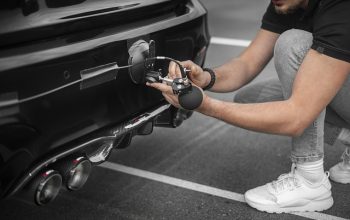The DMV vehicle verification process, which includes a comprehensive VIN number verification, is an essential step for registering a car legally and accurately. This process involves matching the Vehicle Identification Number (VIN) on your vehicle with the records held by the Department of Motor Vehicles (DMV). To complete this, you must visit a certified DMV VIN inspection location where a trained technician will perform the VIN verification. Preparation is key, as you'll need to present documentation such as the title, proof of insurance, and any relevant sales or purchase agreements. The VIN must be checked on critical parts of the vehicle and recorded in the DMV system, ensuring that the car's history, ownership, liability, and insurance details are correct. The cost for this service can vary by state; for example, it ranges from $15 to $24 in California and differs by county or borough in New York. It's crucial to understand your state's specific DMV VIN check requirements to complete the process without delays. Familiarize yourself with the nearest DMV VIN inspection locations and the necessary steps beforehand to ensure a smooth registration experience.
When registering a vehicle, the DMV vehicle verification process, particularly the VIN number verification, is an indispensable step to ensure your car’s details match official records. This article delves into the significance of this procedure and guides you through the VIN inspection process, including the necessary documentation and steps for completion. Whether you’re transferring registration between states or buying a new vehicle, understanding DMV VIN inspection locations and requirements is key to avoiding complications. We will also explore the costs associated with VIN verification in different states to help you navigate this essential aspect of vehicle ownership with ease and confidence.
- Understanding the Importance of DMV VIN Verification for Vehicle Registration
- Navigating the VIN Inspection Process: Steps and Documentation Required
- Locate DMV VIN Inspection Stations Near You: A Comprehensive Guide
- Costs and Considerations for DMV VIN Number Verification in Different States
Understanding the Importance of DMV VIN Verification for Vehicle Registration
When registering a vehicle with the Department of Motor Vehicles (DMV), one critical step that cannot be overlooked is the DMV vehicle verification process involving the Vehicle Identification Number (VIN) inspection. The VIN number verification serves as a crucial link between your car and its official record, ensuring that it is indeed registered and legitimate. This process is not merely a formality; it is a safeguard against fraudulent activities and helps maintain accurate vehicle ownership records. Each character in the 17-digit VIN encodes important information about the vehicle’s make, model, year, and manufacturing details, making the DMV VIN inspection a vital component of the registration process.
To undergo the DMV VIN inspection, you must locate an authorized DMV VIN inspection location. These designated centers are equipped to validate your car’s VIN against the DMV’s records. The DMV VIN check requirements typically involve presenting the vehicle in question, along with any necessary documentation, such as the title and proof of insurance. The VIN verification process is straightforward: a qualified technician will examine the VIN on your vehicle to ensure it matches the information provided by you and recorded in the DMV database. This step is non-negotiable for legal registration, and it helps prevent issues with vehicle history, liability, and insurance coverage. Whether you are transferring plates from an old car or registering a newly purchased vehicle, completing this VIN number verification is essential to ensure your registration is both valid and in full compliance with state regulations. Understanding the importance of this process and preparing all required documents beforehand will facilitate a smoother and more efficient registration experience with the DMV.
Navigating the VIN Inspection Process: Steps and Documentation Required
When navigating the DMV vehicle verification process, the VIN number verification is a critical step to ensure your vehicle’s identification number matches the records at the Department of Motor Vehicles (DMV). This alignment is essential for maintaining valid registration and compliance with state laws. The VIN inspection process begins with locating the official DMV VIN inspection locations in your area, where a certified inspector can authenticate your vehicle’s VIN against the title and registration documents you provide. To initiate this process, gather all necessary documentation, which typically includes the completed VIN verification form, the vehicle title, proof of insurance, and any bill of sale or purchase agreement relevant to the transaction. Ensure that these documents are current, accurate, and reflect the correct VIN. Once at the DMV VIN inspection location, the certified inspector will carefully examine the VIN on your vehicle’s physical components, such as the dashboard, engine block, and vehicle frame, ensuring that the number matches the one you’ve reported. This step is non-negotiable for completing the DMV registration inspection and finalizing your car registration. After a successful verification, the inspector will provide you with the necessary documentation to present at the DMV office for the final steps of your vehicle registration process. The VIN verification process, including the visit to DMV VIN inspection locations, is designed to protect both the driver and the state by ensuring that every vehicle on the road is properly registered and legally accounted for. It’s advisable to familiarize yourself with the DMV VIN check requirements in your specific state to ensure a smooth process, avoiding potential delays or complications.
Locate DMV VIN Inspection Stations Near You: A Comprehensive Guide
When navigating the DMV vehicle verification process, locating an authorized VIN Inspection station is a critical step for confirming your vehicle’s unique VIN number aligns with state records. This verification is an integral component of the DMV registration inspection, ensuring that each car is registered accurately and legally. To find a nearby DMV VIN inspection location, start by visiting the official DMV website for your state, as it often provides a searchable directory or an interactive map highlighting all certified stations. Alternatively, you may contact the DMV directly to receive guidance on the nearest authorized VIN number verification facility. It’s essential to choose a station recognized by the DMV, as their VIN verification process must adhere to strict standards set forth by the department. Upon arrival at the inspection station, be prepared with your vehicle, the completed VIN verification form, and any other documents required for the DMV VIN check requirements. These may vary slightly from state to state but typically include proof of ownership, insurance information, and a valid driver’s license. By ensuring all necessary paperwork is in order and knowing the VIN verification cost ahead of time, you can expedite the process and ensure a smooth transition for your vehicle registration.
Costs and Considerations for DMV VIN Number Verification in Different States
When navigating the DMV vehicle verification process, understanding the costs and considerations for a VIN number verification is paramount. Each state has its own set of rules and fees associated with the DMV VIN inspection, which is a critical step in ensuring your vehicle’s registration remains valid. The VIN inspection, a component of the DMV vehicle verification process, involves a trained inspector examining your car’s Vehicle Identification Number to ensure it matches the one on record with the DMV. This alignment is essential for legal compliance and accurate tracking of vehicle ownership and history.
The cost of a DMV VIN inspection can vary significantly from state to state. In some regions, the fee may be included in the overall registration renewal cost, while in others, it might be a separate charge. For example, in California, the VIN verification process requires a visit to a DMV-authorized inspection station, and the cost can range from $15 to $24. In contrast, New York State has its own network of locations for DMV VIN inspection, with fees that might differ based on the county or borough where the inspection takes place. It’s crucial to consult the specific DMV VIN check requirements for your state to ascertain the exact procedure and associated expenses. Regardless of location, the DMV registration inspection ensures that your vehicle’s documentation is accurate and up-to-date, which is not only a legal requirement but also a safeguard against fraud and theft. Before proceeding with the DMV VIN inspection, ensure you have all the requisite documents, including the VIN verification form, to avoid any delays or complications in the registration process.
When navigating the vehicle registration landscape, adhering to the DMV vehicle verification process is paramount. A thorough VIN number verification ensures the integrity of your car’s records and your compliance with state regulations. By understanding the VIN inspection steps, having the necessary documentation at hand, and being aware of the costs involved in DMV VIN inspections across different states, you can seamlessly complete this critical aspect of registration. Utilize the guide to locate DMV VIN inspection locations conveniently. With these tools and knowledge, your vehicle’s registration process will be conducted efficiently and legally, ensuring a smooth journey on the road.



